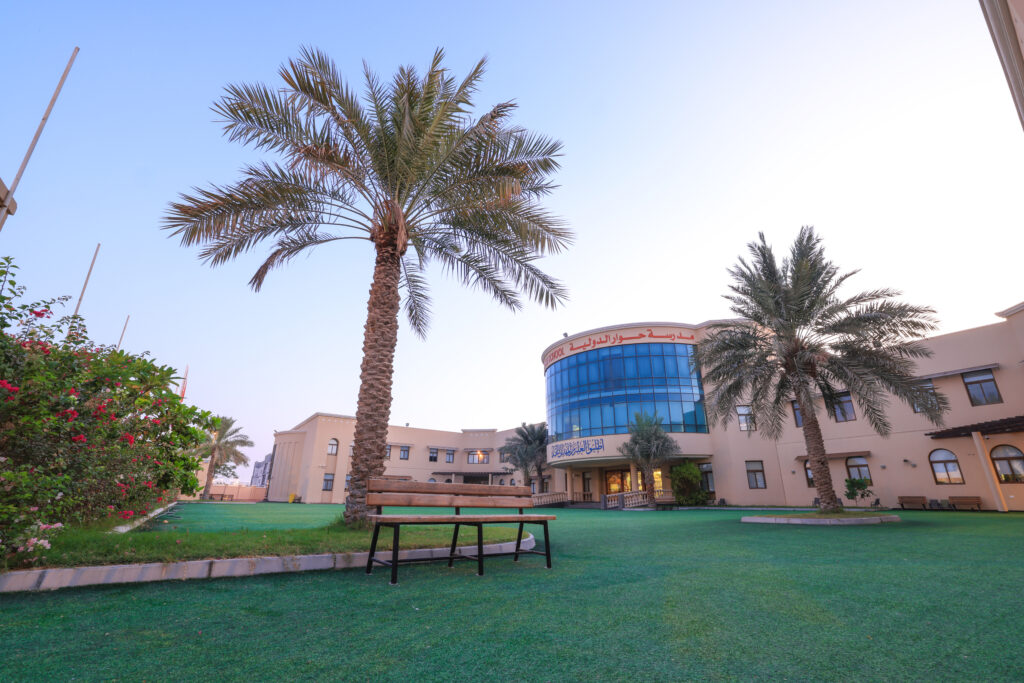Welcome to Hawar International School Nursery where we guarantee your child will have an enjoyable and excellent start to their education. The nursery is housed in its own fully equipped building within the school grounds. We welcome children from the age of 3 years old. All of our staff are fully qualified and our nursery has earned high praise from School Inspectors, Parents, and School Governors. Quality Assurance, November 2010 reported “Children are enthusiastically welcomed into the setting, they are valued and respected because staff ensure that each child has the opportunity to engage in all aspects of the curriculum, whether they attend daily or on a part-time basis. The provision of ‘helping children make a positive contribution’ is outstanding. We aim to have an environment which is welcoming for you and your child; for parents and staff to work together to enable each child to grow in confidence as they learn to play/work within the security of our nursery. The nursery accepts children from 3 years. Qualified nursery staff provides a carefully planned and well structured program of activities where the emphasis is on learning through play, enjoyment and fun.
Children move through stages of development as they mature. The rate of development varies from one child to another. Development is influenced by the experiences children have, as well as by hereditary factors. Children may grow rapidly in one area and more slowly in another. The direction of development is from general to specific, from dependence toward independence and interdependence, and from gross motor control toward fine motor control.
Kindergarten children, no matter what their cultural and experiential background, have characteristics in common with other children of their age and characteristics that are particularly their own.
Children develop socially and emotionally during the Kindergarten year. At the beginning of the year some children may be shy and appear to lack initiative. However, as they come to know the situation, the teachers and peers, they usually gain confidence and begin to establish friendships and become an active part of the class. Other children may be too assertive prior to learning from experience more appropriate ways of relating to peers. It is a time of testing and exploring social relationships.
Kindergarten children are eager to be trusted with responsibility. They appreciate going on errands, using proper tools, participating with grown-ups in such activities as cooking, bringing things from home, and suggesting solutions to practical problems. Although there are some senses in which Kindergarten students are still egocentric (that is, tied to their own view of things) they are also able, in a suitable group environment, to be of help to each other.
Physical activity is one common characteristic of Kindergarten children, although children vary a great deal in the development of physical skills and abilities. Some children are slow and cautious about trying new things; others seem to accept any challenge that is presented. Most Kindergarten children are full of energy, ready to run, swing, climb and jump, and are eager to try their strength by moving big blocks or boxes. They are developing a sense of rhythm, and enjoy such activities as marching, jumping or clapping to music. These group activities need to be short and allow for more participation than standing. Required stillness is more exhausting and stressful for most Kindergarten students than movement.
Sensory development is uneven. The coordination of the eyes and other senses are still developing. Physical growth has slowed down. It is a time of consolidating gains and developing fine motor control. However, over-emphasis on fine motor activities such as writing, cutting and making very discrete visual discriminations may result in tension and frustration.
Kindergarten children love to talk. Their intellectual development is reflected in the rapid growth of vocabulary and the power to express ideas. They are developing visual and auditory memory and the ability to listen to others. Their ears are keen but they still need help in distinguishing sounds, although they can pick up another language and accurately imitate other people’s intonations and inflections. They are especially keen to acquire new words (the names of dinosaurs, for example) and to use such words as “infinity” and “trillion”. Kindergarten children welcome opportunities to be inventive with language, to play with rhyming, to joke, to explain things to each other and even to argue.
Opportunities to talk about what they are doing, what they see and what they hear help children construct meaning and learn from their experiences. The language and ideas shared by others enable children to gradually organize and attach meaning to their daily observations and activities.
Kindergarten children have a powerful urge to find out about things, to figure things out. They ask many questions, often deep unanswerable questions and they love to play guessing games or solve riddles. Their curiosity leads them to figure out concepts and relationships, and become interested in symbols. They enjoy listening to stories, but they do not learn very much from passive attention to the teacher or mere listening to information. The intellectual growth of Kindergarten students comes from exploration, testing and investigating rather than only from listening.
Descriptions of general characteristics are helpful in understanding children. However, such normative statements do not provide the information teachers need about particular children. The teacher’s systematic observations of children provide the information needed for appropriate planning.
During the Kindergarten year, the behavior of many children changes from the relatively rambunctious behavior of a four- year-old to the relatively mature and responsive behavior of a five-year-old.
School Address
Hawar International School
Building 22, Road 42, Block 910 West Riffa, Kingdom of Bahrain
P.O. Box: 38338
Contacts
Phone: +973 13 666 555
Fax: +973 13 666 554
Email: info@hawarschool.com

